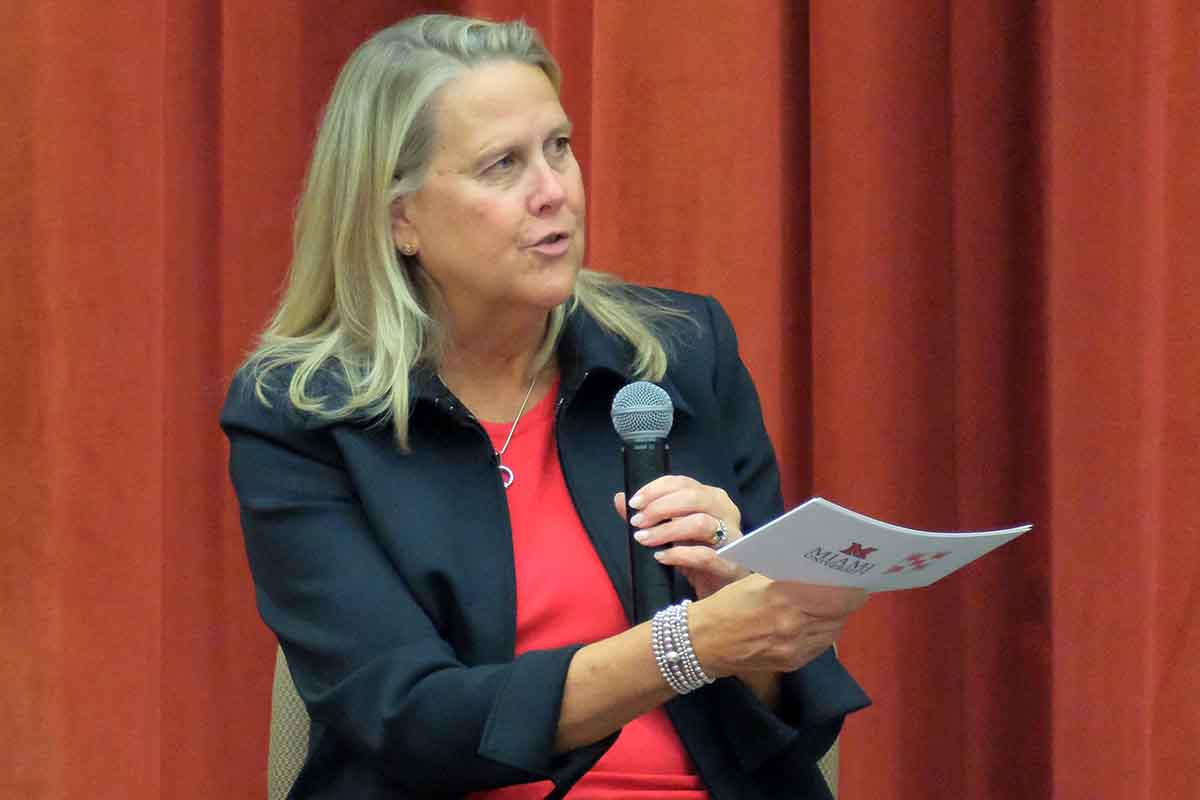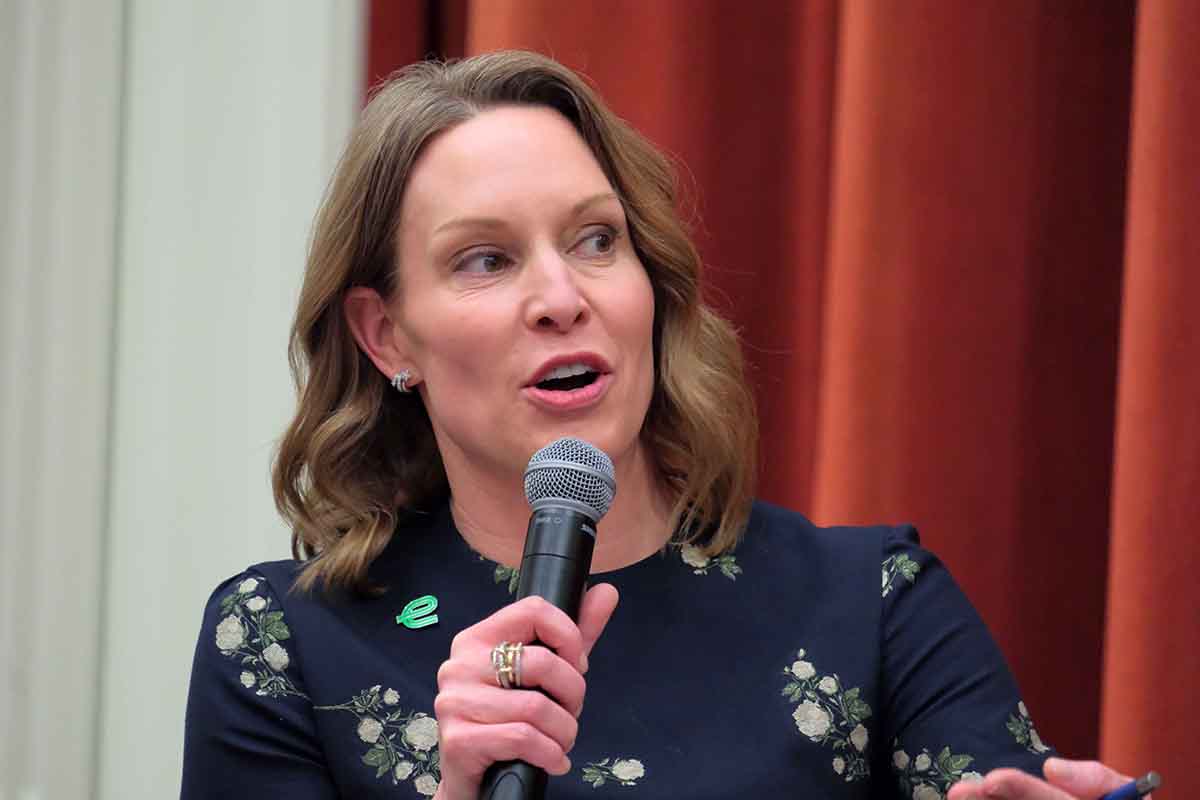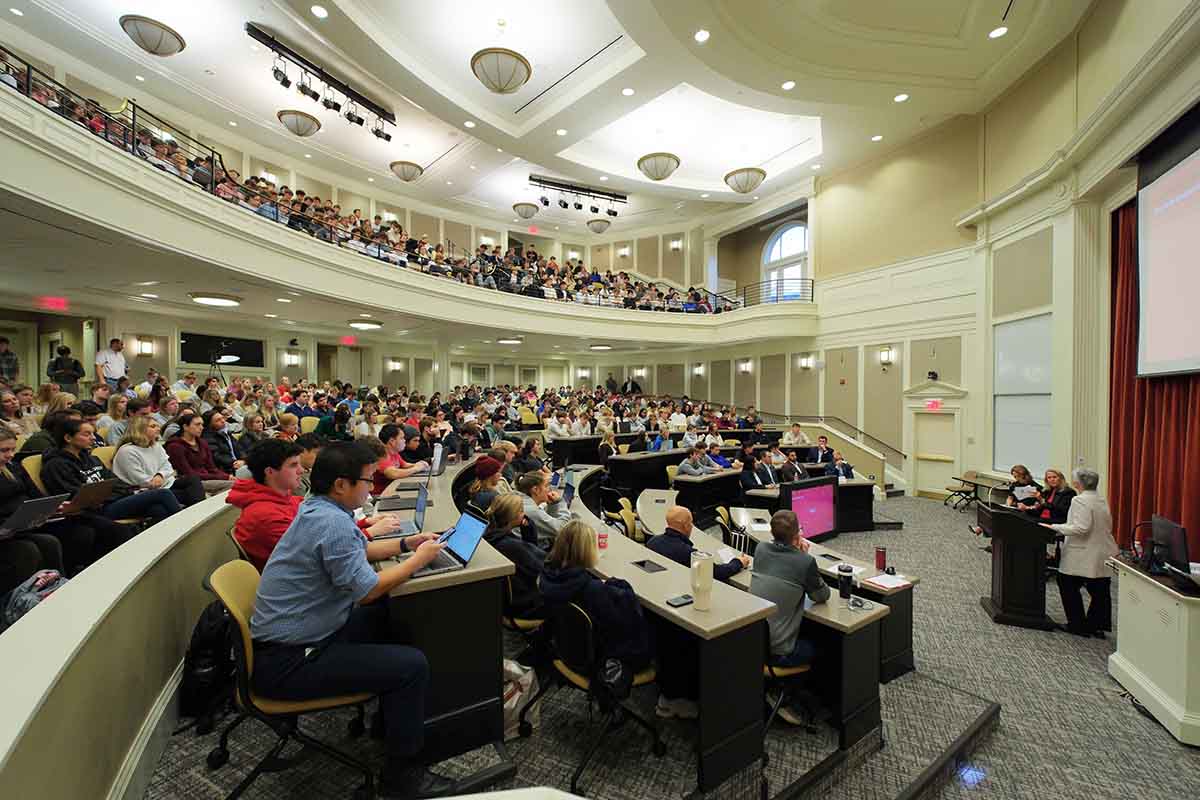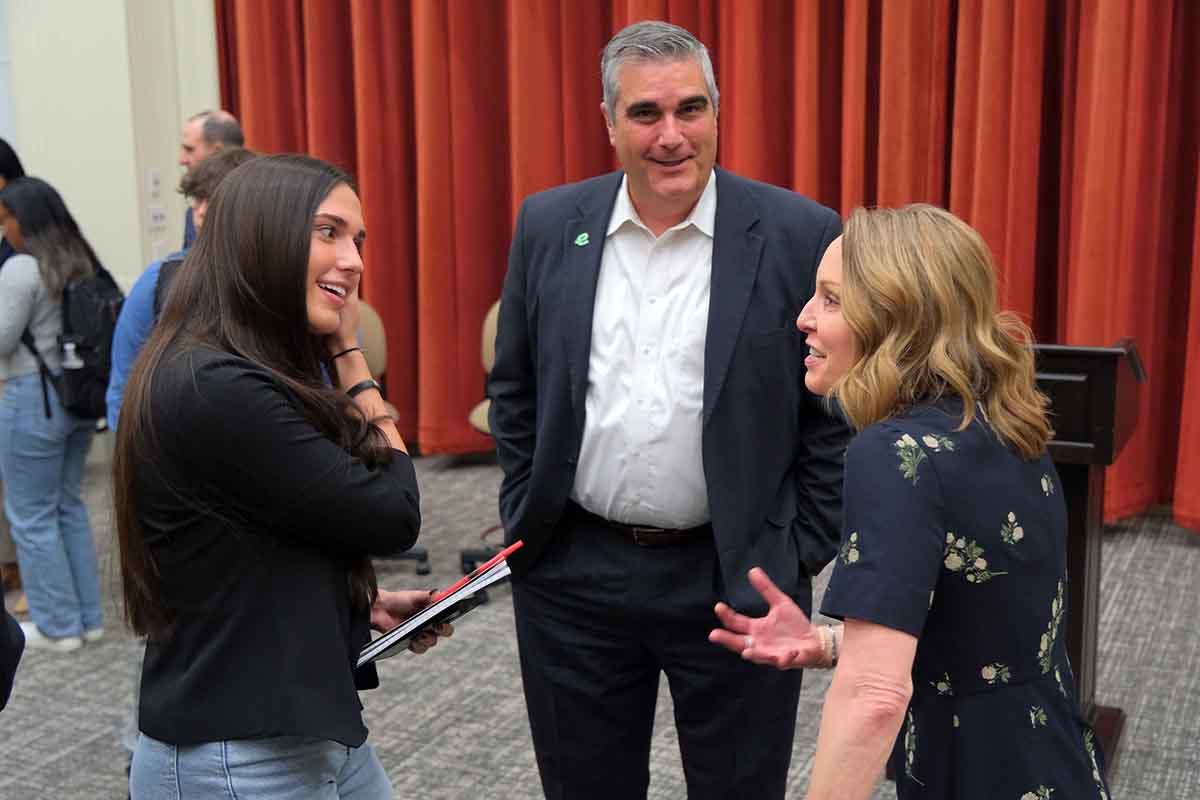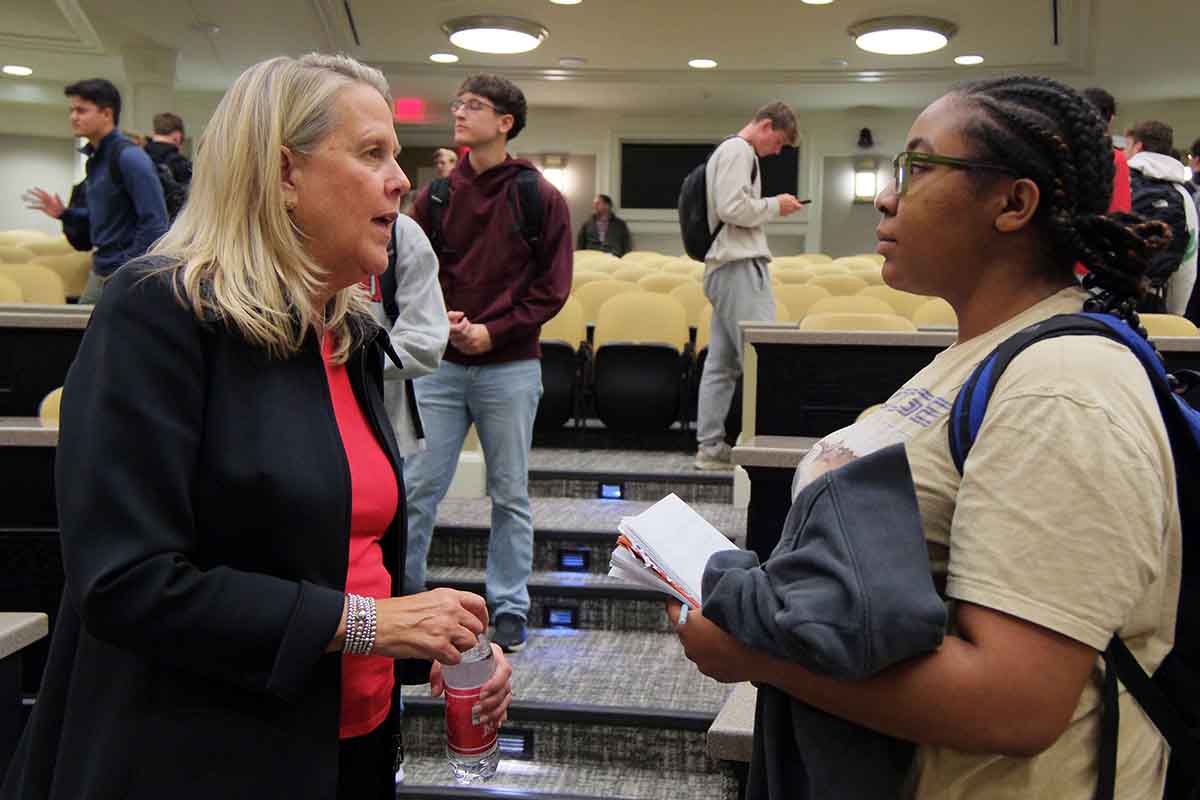From cars to cats, CEO alums discuss changing role of technology in business
Two Miami alumnae, CEOs of major companies, talk tech and work at Farmer School of Business
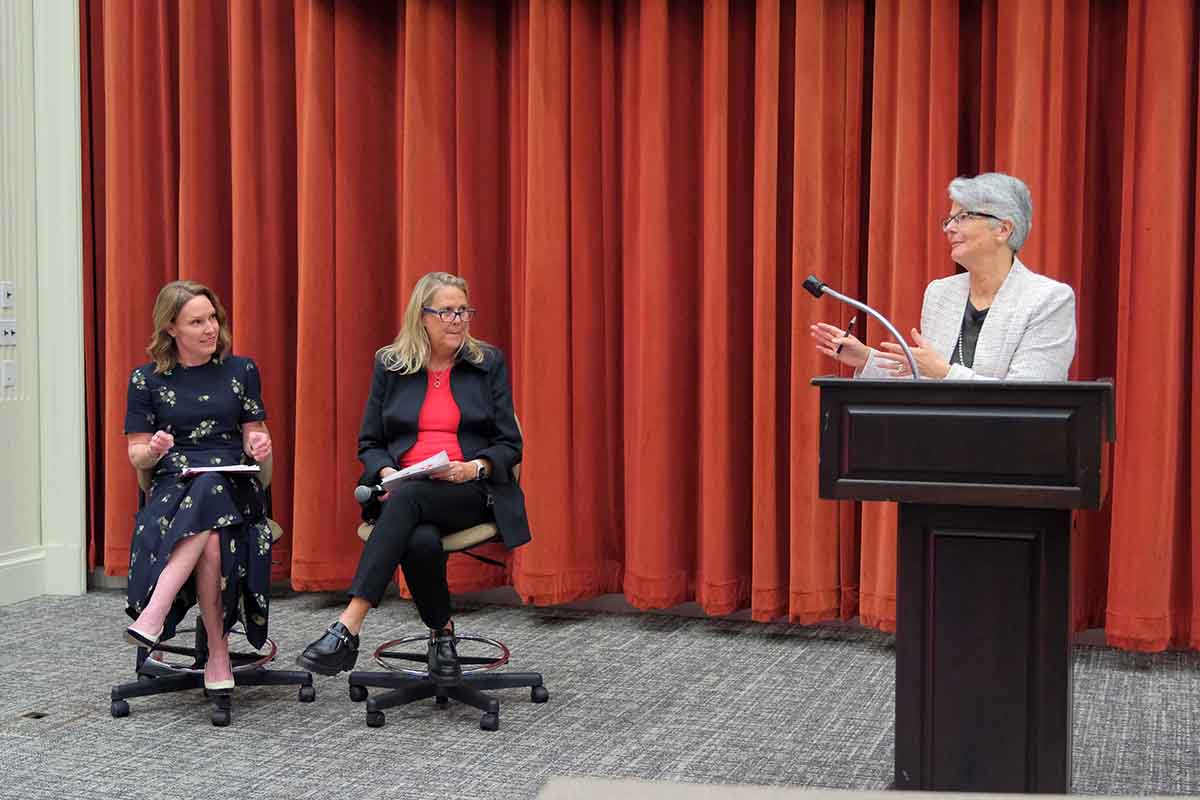
From cars to cats, CEO alums discuss changing role of technology in business
A pair of Miami University alumnae who have become CEOs of major companies visited a packed Taylor Auditorium this week to discuss how business and technology have intersected in their respective companies.
Chrissy Taylor got her Sociology degree and Business Administration minor in 1998. She now heads up Enterprise Mobility, the rental vehicle company her grandfather started with seven cars in 1957.
“I was not the greatest student to ever walk across the academic quad, but I did walk away with countless experiences and relationships that continue to influence my life and career every single day, as well as important lessons learned like the dedication required to train hard, or the discipline required to manage both school and sports, and the teamwork required to ultimately succeed on and off the field,” she said.
Nina Leigh Krueger earned her degree in Marketing at Miami in 1983. She has worked her way up through Nestlé Purina, from intern to president of Nestlé Purina North America in 2021.
“In the U.S., we feed over 100 million dogs and cats every single solitary year, and that's an extremely important responsibility that we do not take lightly. We always say our number one priority is quality and safety, and we absolutely never deviate from that, not only in our products, but safety for our employees,” Krueger said.
Farmer School of Business dean Jenny Darroch asked the women questions about their respective journeys and how the newest technologies are changing the way their businesses operate.
What is one human capability that machines just can't replicate?
Krueger: “Sound judgment is critical for all leadership. So you have to look beyond resumes and credentials. You're not going to find judgment in other ways. You have to understand how people make decisions, and you have to understand how people deal with ambiguity. That's really, really important. We talk about how judgment sits at the intersection of experience and ethics, and we place a huge emphasis on bringing cross functional roles into our leaders, so that they can understand how different pieces work together, so that they can also understand the tension points.”
Taylor: “Something that can never be replaced by technology is empathy and compassion. It's the ability to put yourself in someone else's shoes so that you understand what they're going through. And that takes maturity, that takes experience, that takes perspective. And the only way that you can really teach that is to put yourself in real world experiences, hands-on learning, and then identify that and to train that and teach that. You really have to watch your mentors, watch your managers, and learn by example.”
What abilities make a new graduate immediately valuable in a technology-enabled world?
Taylor: “If you have those leadership skills, you can then apply what you learned at Miami and your technical skills to that and marry those two things up, because most of the time our business can teach technical skills. We have other programs that you can go back to school, you can go to classes, so that, if you're an accountant and you need a certification, we can provide all that. But what we're looking for is level five leadership, and those core leadership qualities.”
Krueger: “I would say comfort with ambiguity. Job descriptions and technology are changing faster than anything else, so we need we need people who can work across functions, who aren't afraid to make mistakes. Also, communication skills. I mean, technology does not communicate. You can create a perfect AI letter. You can create a perfectly generated report that you need to do, but you need to put that human side into it. So communication skills are absolutely critical.”
Over the next five to 10 years, which emerging technologies will most disrupt your core business?
Krueger: “We have to be marketing to AI agents. They're the ones that are going to choose the products for the consumers in the future. It's not going to be us. So what we're trying to do is to get them into what we call our ecosystem so we can start to problem solve for them at pain points, so that they look at Purina for what they need to do,” she said. “We have a robot dog, Spot, in most of our factories. Spot goes around and just really listens and understands, ‘Is a piece of equipment getting too hot? Is the rotation sounding wrong?’ So that we know that it's either time to do maintenance or it is time to take care of something else.”
Taylor: “I think that the mobility landscape and technology within it is moving so quickly, and it is one of the most dynamic industries out there right now – connectivity, AI, EV, autonomous vehicles. It is moving quick. It's rapid, it's very cool, but we've got to figure out what our place is in that,” she said. “There's a ton of opportunity. But what's important is that it's an evolution, not a revolution. And when we think about change in the future, we want to make sure that we're leaning in on our core competencies, because that will be the foundation in which we will grow.”
- How do you ensure that technology decisions reinforce long-term trust with customers and society, and when you hire people, how do you assess the capacity for ethical values driven decision making?
Krueger: “What we do is we bring ethics into the design phase. We talk about it from the very, very beginning, how it is, what it is, and what does it look like. We don't want people who take shortcuts. That's not really important to us at all. We're in there for the long game, the judgment, to weigh a second and a third time and to respectfully challenge in those situations. That's what we look for. Because technology can't take away the human insight. It can't take away the judgment. So we have to have people who are willing to raise their hand and stand up and say, ‘This doesn't feel right. This makes me uncomfortable. This doesn't represent our values.’ And then we need to listen to what they're saying and then look for a different solution.”
Taylor: “When people are rushed and making decisions, they're usually short-term decisions, and they're not the best for the business, for that individual, for the customer. We believe that our business is the ultimate team sport. Our brand is the most important thing that we own, because you can work for 68 years or 100 plus years on your brand, and it's so amazing, and you do one thing wrong, it goes away like that, and it will take you another 100 years to get it back.”
- What keeps you up at night?
Taylor: “The thing that keeps me up at night is brand and reputation. We have 90,000 amazing employees. I want to say they always do the right thing, and I always do the right thing, but sometimes you don't, and sometimes our customers don't do what they say they're going to do. We're a big business. We must be responsible. There’s a lot of responsibility in that. And so brand and reputation should be at the top of all our leaders’ minds. Every single day, it's about trust and reputation and customer experience.”
Krueger: “What keeps me up at night is think how we will continue to provide that high quality nutrition to the consumers, but also when will the consumers start to feel like they do have more spending, that they have more consumer confidence, because that will help us as well. The good news is that we know that the younger generation is creating households with pets very fast too. So, it's not that it's all doom and gloom, but what keeps us up at night is how consumers are feeling, because we're a consumer package.”
- Advice for students?
Taylor: “Love the experience. Have fun. Every single day is not a great day, and it can't be easy. It just isn't. But in the long haul, man, just have fun. It's such a great experience. And ask a lot of questions and be curious. It. You are so lucky.”
Krueger: “When you're here, take advantage of every opportunity you get. I think there's so many opportunities here, so take advantage of every single one of them that you can. And then I would say, when you get in your first job, be all in. Show up every day with the energy and enthusiasm and curiosity you need to solve that day's problems to be successful in that role.”
